AL-Saddiq Haftar discusses the abduction of MP Ibrahim Al-Dressi, calling it a significant issue. He acknowledges security failures but distances his family from blame. Furthermore, he critiques the current reconciliation efforts by the Presidential Council, expressing a need for unity among Libya’s regions to create a stable state.
AL-Saddiq Khalifa Haftar, recently appointed head of the High Commission for National Reconciliation, has spoken out regarding the troubling disappearance of MP Ibrahim Al-Dressi, which he characterized as tantamount to an abduction. In remarks made during an interview with the BBC, Haftar emphasized, “such incidents can happen in any other country,” highlighting the pervasive nature of such issues.
Haftar acknowledged an element of security failure in the situation but was quick to defend his family. He stated, “This act should not be attributed to Khalifa Haftar or his sons. Frankly, that would be a great injustice.” He stressed that assigning blame to his family members for Al-Dressi’s case would not only be unfair but misrepresentative.
Moreover, Haftar clarified the role of the commission he heads, arguing it should not be seen as a substitute for the Presidential Council’s reconciliation efforts. He pointed out that the council seems to have shifted focus and is currently preoccupied with various other matters since taking on national reconciliation responsibilities. “All that’s happening is a budget being spent in the name of reconciliation with no results on the ground,” he remarked.
The situation in Tripoli and the surrounding western region, currently under the authority of the Government of National Unity led by Abdul Hamid Dbeibah, was not overlooked by Haftar. He expressed regret over the state of affairs there and reiterated his call for all Libyan regions to adopt their initiative to build what he envisions as a “real state.”
The overall sentiment conveyed by Haftar indicates deep concern regarding the security situation in Libya and a desire for unification in the quest for stability. He appears resolute in his mission to foster reconciliation but acknowledges the obstacles they face.
While Haftar’s comments underscore significant issues in the security infrastructure, they also reflect a complicated landscape of governance in Libya. This ongoing situation presents challenges but also highlights the necessity for collective efforts to achieve meaningful progress in national reconciliation.
In conclusion, AL-Saddiq Khalifa Haftar’s remarks on the abduction of MP Ibrahim Al-Dressi bring to light the prevalent security challenges in Libya. His distinction between his commission and the Presidential Council’s efforts highlights potential gaps in governance, while his call for unity among Libyan regions signals a push for a more comprehensive approach to national reconciliation.
AL-Saddiq Haftar’s statements on the abduction of MP Ibrahim Al-Dressi highlight serious security issues in Libya. He distinguishes his role from that of the Presidential Council, suggesting inefficiencies in current reconciliation efforts. His plea for cooperation among Libyan regions reflects a larger vision for a unified and stable nation.
Original Source: libyaobserver.ly




